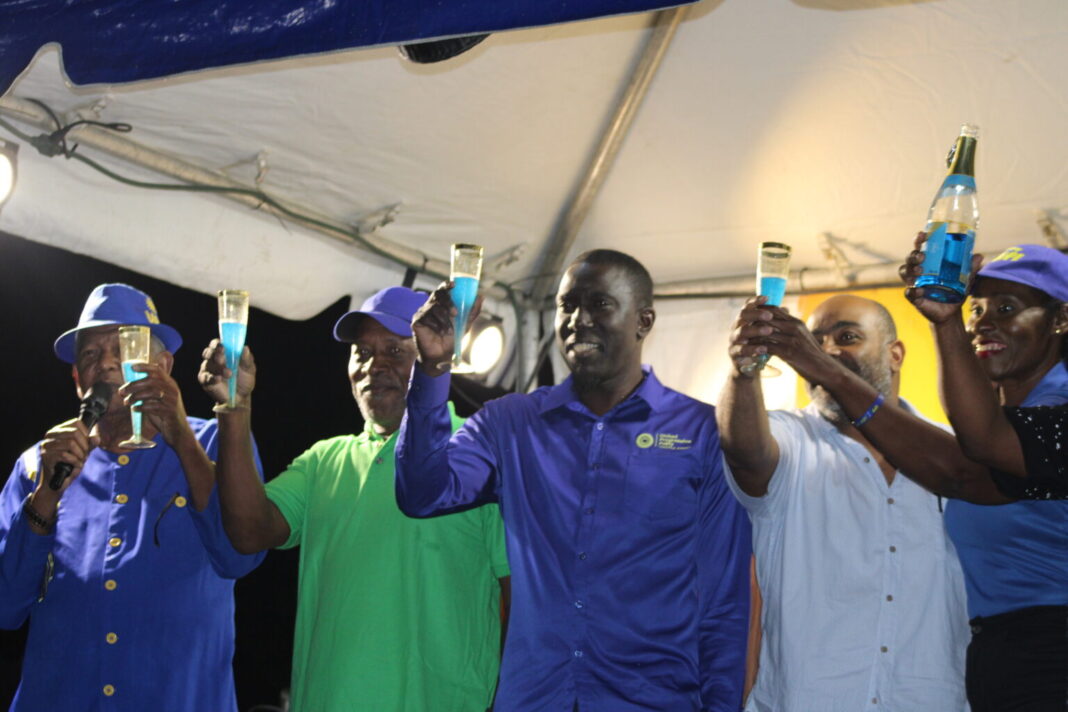Election speculation erupted across Antigua and Barbuda last week as Prime Minister Gaston Browne delivered his most explicit hint yet that citizens could soon be heading back to the polls ahead of the 2028 constitutional deadline.
The two major political parties held rallies on last Thursday, underscoring how both sides of the political divide have been gearing up for an election which is three years away.
Prime Minister Gaston Browne, speaking at the Antigua and Barbuda Labour Party (ABLP) rally in New Winthorpes endorsed newly reappointed Senator Michael Freeland as the candidate for St George, and suggested to his supporters that elections were imminent.
“Many of you are agitating for us to go to elections. But I say to you, it’s coming soon, and you’ll be called at the right time,” Browne told the gathering.


Baldwin Spencer




The Prime Minister said that following the 2023 general election results which saw the ABLP hold a narrow one-seat majority in the House of Representatives, the leadership has moved to reinvigorate the party through new and younger faces.
Since the general election, the ABLP has expanded its grip on power with an effective three-seat majority, following the death of former Independent MP Asot Michael and the by-election win of MP Rawdon Turner and the defection of MP Anthony Smith from the United Progressive Party to independent MP.
“Somebody asked me if I’m going to wait to catch them with their pants down, but I said to them, right now, their pants are always down; so, guess what, we will call elections at the right time,” the Prime Minister added.
The ABLP has also moved to name a number of caretakers for the seats they lost in the 2023 election, with speculation around St Mary’s North preparing for its own primary, following the announcement by Winston Williams that he is hoping to replace Health Minister Sir Molwyn Joseph in the constituency.
“We are building a formidable team for the future,” Browne added, noting that “the Labour Party today is perhaps more vibrant than it has been even since before 2014.”
On the same night, at Thwaites’ Corner, the United Progressive Party (UPP) held its own ‘Fed Up’ rally with Political Leader Jamale Pringle urging supporters to prepare for any sudden election call.


“When people are backed against the wall and they know what information might come forward, they will speedily call the elections,” Pringle warned, encouraging citizens to renew their voter’s ID.
The competing rallies highlighted potentially contrasting campaign narratives with the ABLP emphasizing economic growth under their stewardship, major infrastructure projects, and educational advancements.
Prime Minister Browne presented his administration as the only viable option for continued prosperity.
“When you have an administration that cares about you and would have performed, I said to you that we have earned your support,” he declared. “Let us keep the Antigua and Barbuda Labour Party united. Let’s keep the Antigua and Barbuda Labour Party strong.”
Conversely, the UPP continued to focus on the continued controversy surrounding the Alfa Nero yacht sale and rising crime rates.
Former Prime Minister Dr Baldwin Spencer urged Antiguans to follow Barbuda’s example, where the day before the Barbuda People’s Movement (BPM) secured a decisive Barbuda Council election victory against all five ABLP candidates and two independents.
“The people of Barbuda sent a clear signal. The Barbuda Peoples Movement is in control of the situation over there and the people themselves are an integral part of that movement,” Spencer told the crowd.
Spencer added that “they’re sending a clear signal to us in Antigua that we have got to rise up and understand that this country belongs to us, not Gaston Browne and his [party].”
Pringle directly challenged the administration’s record since the last election, saying: “We cannot take anything this government says. We cannot look to this government for any help because all they’re doing is helping themselves and you, the people, are suffering.”
“The time has come for you to stand up and make a choice as it relates to the future of Antigua and Barbuda,” the Leader of the Opposition added.





